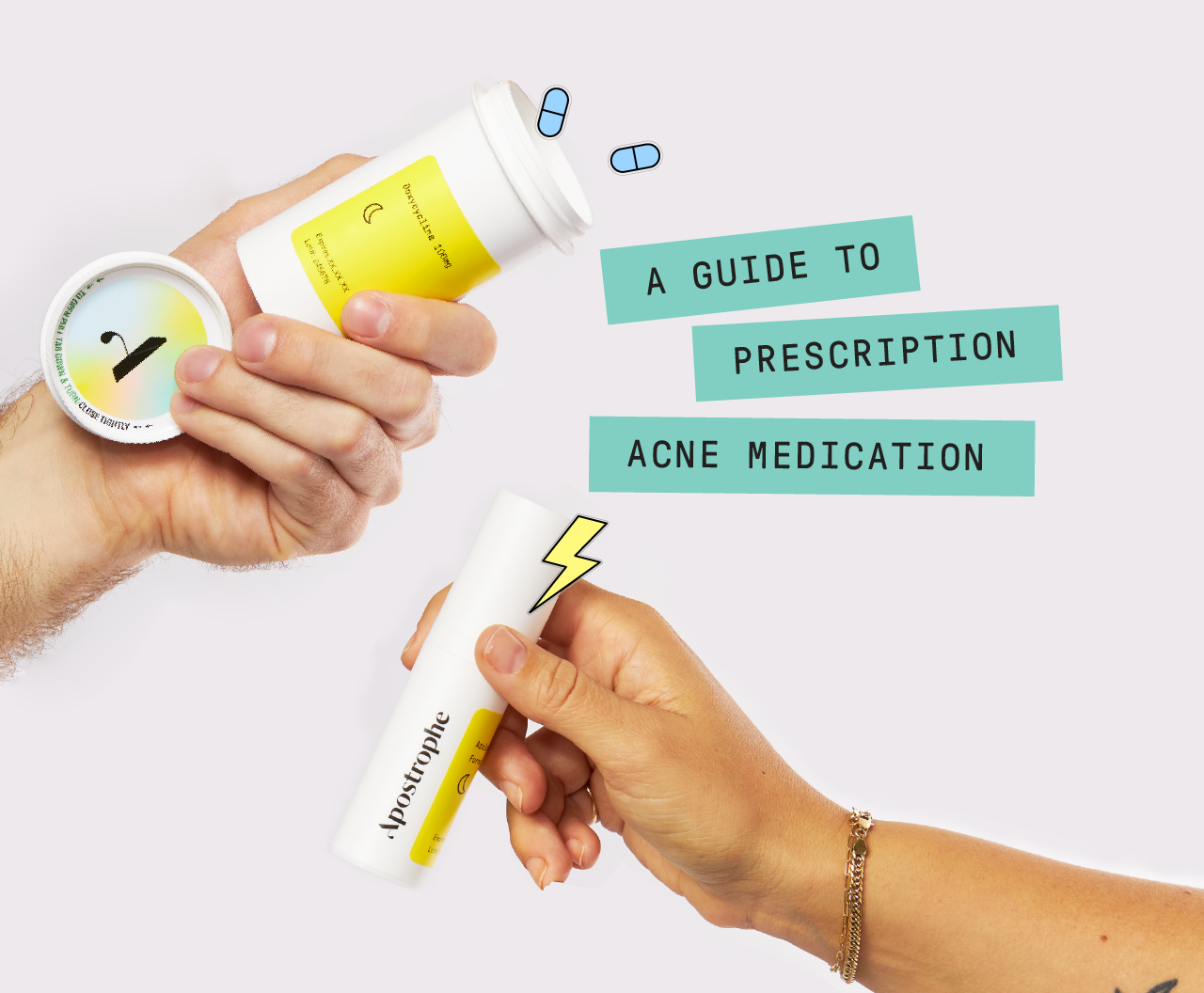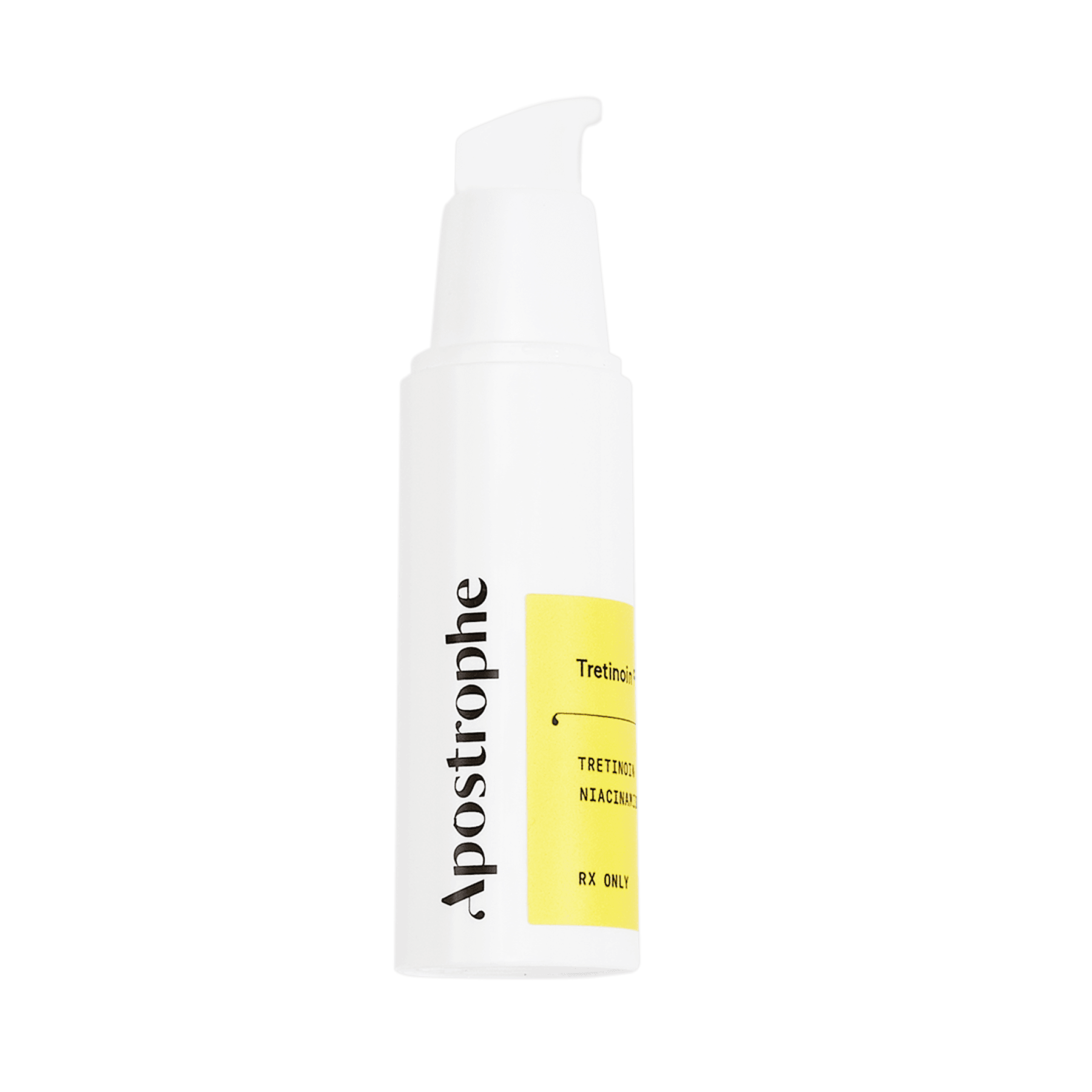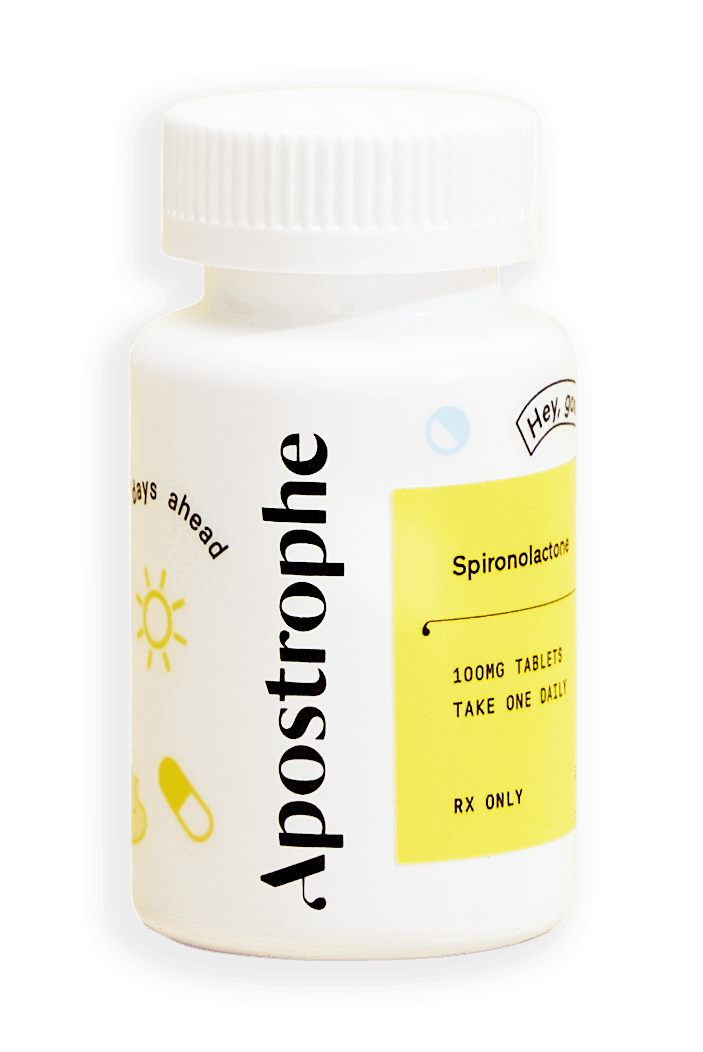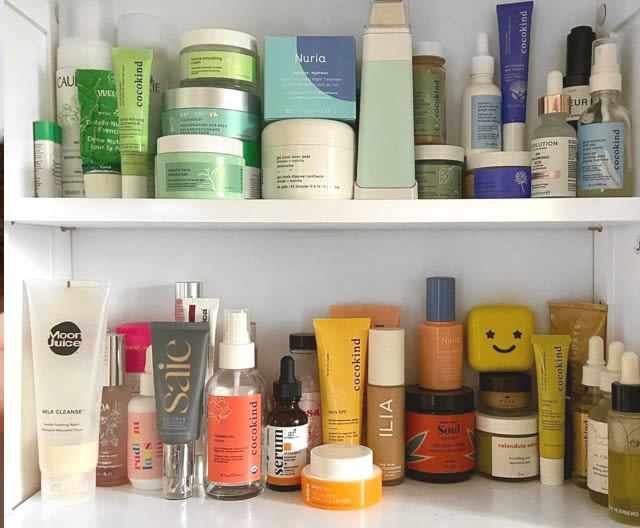Education
A Guide to Prescription Acne Medication


SHARE
Education
A Guide to Prescription Acne Medication
Medically reviewed by Aimee Paik, MD
Written by Apostrophe Team
Last updated 4/5/2024
If you’re dealing with mild, moderate, or severe acne, there are tons of treatments out there that promise help - everything from over-the-counter creams and serums, to more heavy-hitting prescription acne medication. Some work better than others.
When it comes to prescription acne medication, you’ll find both topical and oral acne medication to choose from, and that choice will always come with the guidance and assistance of a board-certified dermatologist or other healthcare provider.
But what causes acne to begin with? Is the answer really going the prescription acne medication route? Are there some other tips, tricks, or other treatments for acne you can try to stop it at the source?
Let’s take a look.
What causes acne?
Acne vulgaris (the medical term for acne) forms when a combination of sebum and dead skin cells build up in your pores and hair follicles, creating a blockage.
Your sebaceous glands create sebum to lubricate your skin and hair. Under normal circumstances, this is a good thing because this sebum also forms a barrier on your skin, protecting it from things like bacteria and other harmful environmental factors.
However, certain things can cause your body to kick its sebum production into high gear, which can lead to blocked pores, pimples, blemishes, and acne.
Hormonal imbalances are one thing that can lead to more sebum being produced. During your period, these hormonal shifts are normal.
You can also inherit oily skin (thanks Mom and Dad!).
Certain habits - like overwashing your face, smoking cigarettes, and leaving your makeup on overnight - can also lead to breakouts.
Then, there are dead skin cells. Our bodies shed them every 40 to 56 days to renew and replace the skin.
It sounds a little iffy, but it’s actually completely normal and good for your skin. But if excess sebum mixes with these skin cells, it can block pores.
Why Use Prescription Acne Medication?
While over-the-counter acne medication (think Clearasil® and Proactiv®) are effective at managing minor outbreaks of facial acne, many people experience persistent acne that just doesn’t go away with regular, store-bought treatments.
Up to 50 million people in the United States are affected by acne annually, ranging from mild breakouts to severe cystic acne.
Over the last few years, there’s also been a rise in the number of adults seeking treatment for acne — often acne that developed specifically in their adult years, rather than originally forming while they were in adolescence.
Prescription acne medication (like tretinoin and isotretinoin, both of which are covered in more detail below) offer a stronger level of acne treatment than store-bought products, making them essential for many people with persistent, cystic or other severe cases of acne.
What Prescription Acne Medications Are Available?
Acne can occur for a variety of reasons, ranging from skin bacteria to excessive levels of sebum production. Because of this, there are several different types of prescription drugs used to treat acne. And for each of those specific drug types, there are specific drugs that fall under them.
Retinoids
Retinoids are some of the most widely used prescription medications for treating and preventing acne. They’re available as both topical (tretinoin) and oral (isotretinoin) drugs, with both options offering a significant level of long-term skin improvement.
Tretinoin
Tretinoin is a topical retinoid that’s available as a cream, gel or solution. Approved by the FDA in 1971, tretinoin is one of the most widely used and effective topical treatments for acne, including outbreaks of inflamed and cystic acne.

PRESCRIPTION TRETINOIN
Target acne, dark spots, and signs of aging with this science-backed ingredient.
Our Tretinoin 101 guide covers tretinoin in detail, from the drug’s development and mechanism of action to its benefits as an acne and anti-aging treatment.
In the United States, tretinoin is a prescription medication used to treat mild, moderate, and severe acne. It’s sold in a variety of strengths, which are prescribed specifically to patients with different skin types. The most common brand names for tretinoin include Retin-A®, Refissa® and Renova®.
There are numerous studies showing tretinoin’s benefits as an acne treatment. In a 2009 study, people given tretinoin for 12 weeks showed significant improvement in facial acne than people given a non-therapeutic placebo over the same period.
Another study from 2015 produced similar results. Acne patients were split into three groups and given either a mix of benzoyl peroxide and clindamycin, a mix of tretinoin and clindamycin or a mix of benzoyl peroxide and nadifloxacin.
The tretinoin/clindamycin group, which received a gel that was 0.025 percent tretinoin and one percent clindamycin, showed drastic improvement, going from an acne level of 13.70 ± 4.80 to 1.30 ± 2.95 after 12 weeks of consistent tretinoin use.
Tretinoin usually produces measurable results within 12 weeks (however, it should be noted that seeing noticeable results can take months), with a reduction in acne and an improvement in skin quality. However, it can often cause a temporary increase in acne and skin dryness during the first few weeks of treatment; a time period called the tretinoin "purge."
Because tretinoin is a topical medication, it has few systemic side effects and is only associated with minor common skin side effects. Overall, it’s generally a safe and effective medication that keeps acne under control long term without the potential side effects of stronger oral anti-acne medications.
Isotretinoin
Isotretinoin is an oral retinoid that treats and prevents acne. Oral isotretinoin is usually viewed as the most powerful acne medication for severe acne on the market and is typically used to treat only the most persistent cases of acne that don’t respond to other treatments.
Dermatologists usually recommend isotretinoin for cystic acne and other severe acne that can cause permanent scarring. Most people know of isotretinoin under the brand name Accutane®.
Like tretinoin, isotretinoin usually produces a noticeable reduction in acne within several weeks of use. And like tretinoin, in some cases, isotretinoin can lead to a temporary increase in acne and dry skin for the first few weeks of treatment. This usually goes away within a few months of regular use.
Overall, isotretinoin is highly effective.
A retrospective study of isotretinoin users showed that more than 95 percent of users experienced excellent, good or fair results from the medication over a period of one to 12 months, with only 5.6 percent of study participants experiencing a relapse after the treatment.
However, one downside of isotretinoin is its side effect profile. In the study linked above, 56 percent of participants experienced some degree of side effects, with around seven percent of patients discontinuing the drug completely due to significant side effects.
Additionally, isotretinoin can cause serious birth defects and therefore should not be used by pregnant women or while breastfeeding. Women of child-bearing age need to be careful about when they use isotretinoin if they intend to get pregnant.
In short, isotretinoin is a powerful and highly effective acne treatment that’s usually reserved for severe cases of acne due to its side effects.
While isotretinoin works extremely well for preventing acne, its larger and more severe range of side effects make it a treatment option that’s usually reserved only for persistent cases of acne that don’t go away with tretinoin or other topical treatments.
Antibiotics
Because antibiotics reduce inflammation and the amount of bacteria in hair follicles and skin, they’re widely used in the treatment and management of acne.
A range of different antibiotics are used to treat acne. Oral antibiotics tend to be prescribed for short periods — often in combination with a topical retinoid or other acne medicine — as long-term use of antibiotics can lead to antibiotic resistance.
Like all prescription medications, antibiotics can cause side effects. People that use antibiotics for acne commonly experience things like photosensitivity, gastrointestinal issues and, in rarer cases, allergies in people sensitive to certain antibiotic medications.
Tetracyclines
Tetracycline antibiotics, such as doxycycline, minocycline and lymecycline, are frequently used as treatments for acne.
Of the tetracycline antibiotics, doxycycline is the most commonly used for acne. Doxycycline is usually prescribed to treat inflammatory acne — a form of acne that results in red, inflamed skin blemishes that can be nodular (large, deep pimples) or cystic (large and severely inflamed).
Doxycycline is almost always used with a retinoid or other topical prescription acne medication, such as benzoyl peroxide. When used daily, it works quickly and effectively to stop inflammation and bacteria, helping you deal with outbreaks of acne and prevent them from coming back.
Erythromycin
An oral antibiotic, erythromycin is also used primarily to treat cases of inflammatory acne. As with doxycycline and other antibiotics, erythromycin works by killing the bacteria that can worsen acne and cause skin inflammation.
Trimethoprim
Trimethoprim is another widely used antibiotic for treating acne. Studies have shown that regular use of trimethoprim in combination with one percent clindamycin lotion results in “significant improvements” in facial and body acne over the course of eight months of treatment.
Topical Antibiotics
In addition to oral antibiotics, some dermatologists prescribe topical antibiotic creams and gels for treating and preventing acne. Topical antibiotics have fewer potential side effects than oral antibiotics and are usually prescribed for less severe and persistent cases of acne.
Some of the most frequently prescribed topical antibiotics for treating acne include clindamycin and erythromycin. Topical antibiotics are often used as an alternative to oral antibiotics in young children due to their less extensive side effect profile when compared to oral acne medication.
Oral Contraceptives
Women with acne can also use hormonal birth control as a treatment option. Right now, three birth control pills are approved by the FDA for treating acne in the United States — Estrostep®, Ortho Tri-Cyclen® and YAZ®.
All of these pills contain a combination of estrogen and synthetic progestins, meaning they’re only suitable for use by women.
Over-The-Counter Acne Medication
In addition to prescription medications, doctors often recommend the use of over-the-counter acne medication.
Some of the most common over-the-counter acne medications include adapalene, which is a topical retinoid similar to — but less powerful than — tretinoin, and retinol, which is widely used in over-the-counter cosmetic products and skin ointments.
Our guide to tretinoin and over-the-counter acne products explains how many non-prescription acne treatments work, as well as their effectiveness compared to prescription medications like tretinoin.
Which Acne Medication is Best For You?
Acne can vary hugely in severity and difficulty of treatment, meaning that the right solution for you could be completely different to the right solution for another person.
Because of this, there’s no “best” acne medication for everyone. If you have persistent or severe acne that doesn’t seem to respond to over-the-counter acne medication, the best approach is to talk to your doctor or schedule an appointment with a qualified dermatologist or other healthcare provider.
The right provider will be able to check your acne and recommend a suitable treatment based on your symptoms and previous experiences with acne medication. They may prescribe a topical or oral retinoid, an antibiotic, an over-the-counter cream or a combination of several products.
By following your provider’s instructions and regularly using your acne medication, you’ll be able to significantly reduce the severity of your acne, improve your skin and prevent future outbreaks over the long term.
Other Ways to Prevent Acne
While you may need to call in the big guns to help you get the clear, glowing skin you’ve always dreamed of, there are plenty of other real-life tips you can utilize to help keep your skin happy.
🚿 Wash your skin twice a day, as well as after you work out. This will remove dirt, excess sebum, dead skin cells, and bacteria - all of which can lead to breakouts.
💧 Keep your skin hydrated. If you have an oily or acne-prone skin type, you may think you can skip moisturizer. Wrong. If your skin is dry or not moisturized, your body will work overtime to lubricate your skin by producing more oil, which can contribute to your acne woes. In other words, skin dryness is something to avoid at all costs.
👋 Hands off your face. Your fingertips may be dirty or carry bacteria, which can make acne worse. If you absolutely must touch your face, make sure that you wash your hands thoroughly first.
💋 Switch to non-comedogenic makeup - this is a fancy word that means it won’t clog pores.
Prescription acne medications offered through Apostrophe
Apostrophe offers access to prescription medication that works to treat facial acne and body breakouts.
Through the board-certified dermatologists and licensed providers on our platform, we can help with the management of acne - including hormonal acne, adult acne, cystic acne, persistent acne, and more.
Just complete a virtual consultation form with information on your skin condition, medical history, and photos of your skin.
After that, you'll get your first customized treatment plan (including prescription products) crafted by a board-certified dermatologist.
Sources:
Acne (2012). Retrieved from https://www.womenshealth.gov/a-z-topics/acne
Physiology, Sebaceous Glands, (2021). Stat Pearls. Retrieved from https://www.ncbi.nlm.nih.gov/books/NBK499819/
Makrantonaki, E, Ganceviciene, Zouboulis, C (2011, Jan-March). An update on the role of the sebaceous gland in the pathogenesis of acne. Dermato Endocrinology. 3(1), 41-49. Retrieved from https://www.ncbi.nlm.nih.gov/pmc/articles/PMC3051853/
Zeichner, J. A., Baldwin, H. E., Cook-Bolden, F. E., Eichenfield, L. F., Fallon-Friedlander, S., & Rodriguez, D. A. (2017). Emerging Issues in Adult Female Acne. The Journal of clinical and aesthetic dermatology, 10(1), 37–46.retrieved from https://www.ncbi.nlm.nih.gov/pmc/articles/PMC5300732/
Koster, M.I. (2009, July). Making an epidermis. Annals of the New York Academy of Sciences. 1170, 7-10. Retrieved from https://www.ncbi.nlm.nih.gov/pmc/articles/PMC2861991/
Acne: Tips for Managing. (n.d.). Retrieved from https://www.aad.org/public/diseases/acne/skin-care/tips
Moisturizer: Why You May Need It If You Have Acne. American Academy of Dermatology. Retrieved from https://www.aad.org/public/diseases/acne/skin-care/moisturizer
10 Skin Care Habits That Can Worsen Acne. (n.d.). Retrieved from https://www.aad.org/public/diseases/acne/skin-care/habits-stop
Clindamycin Topical. (2016, October 15). Retrieved from https://medlineplus.gov/druginfo/meds/a609005.html
Tretinoin Topical. (2019, March 15). Retrieved from https://medlineplus.gov/druginfo/meds/a682437.html
Baldwin, H. (2020). Oral Antibiotic Treatment Options for Acne Vulgaris. The Journal of Clinical and Aesthetic Dermatology. 13 (9), 26–32. Retrieved from https://www.ncbi.nlm.nih.gov/pmc/articles/PMC7577330/
Shop this post

Tretinoin

Oral Spironolactone

Clindamycin

Oral doxycycline

Topical Spironolactone
Like what you just read? Sign up for our email list to get the scoop on skincare science delivered straight to your inbox.

Education
What is milia?
What is milia? Today, we’re jumping into one type of bump that you may have heard about most commonly in infants — milia.
Read More
Education
Best moisturizer for acne-prone skin
If you have combination acne-prone skin, figuring out which moisturizer is best for your skin might be tough. In this guide, we break down the best moisturizer for combination, acne-prone skin.
Read More
Education
How to build a face care routine
As you get into skincare, it might seem overwhelming, especially trying to figure out the order you're supposed to apply products in. Below, we detail how to build a face care routine for your skin!
Read More
